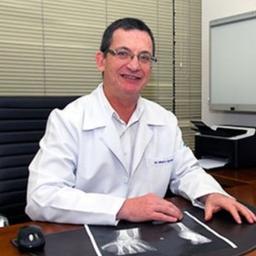Additional Filters
Best Hand surgeon
Found 2 Hand surgeon
Dr. Mauro Zyman
Orthopedics, Traumatology and Hand Surgery in São Paulo
Hand surgeon
Dr. Carlos Roberto De Arruda Mendes
Orthopedist and Traumatologist, Hand Surgeon in São Paulo
Orthopedic traumatologist
Visitors who were interested in Hand surgeon also searched for:
Hand surgeon by cities
Visitors who were interested in Hand surgeon also searched for:
General information on medical treatment
What does a hand surgeon do?
A hand surgeon is a doctor specialized in the treatment of injuries, diseases and deformities that affect the hands, wrists, forearms and peripheral nerves. This professional has in-depth knowledge about the complex anatomy of the hand, including bones, joints, tendons, nerves, blood vessels and soft tissues. Their work is fundamental to restore function and aesthetics of the hands after trauma, sports injuries or degenerative conditions. The hand surgeon works to preserve or recover mobility, sensitivity and strength, ensuring that the patient can perform their daily activities with independence.
The importance of hand surgery in modern medicine
With the increase in work accidents, sports and excessive use of electronic devices, hand surgery has become an essential specialty in contemporary medicine. The growing incidence of injuries related to repetitive movements has demanded the development of microsurgical techniques and specific rehabilitation methods. This specialty goes beyond surgical interventions, also focusing on preventing complications and conservative treatment when possible. The hand surgeon is qualified to deal with multiple conditions simultaneously, always personalizing treatment. The central purpose is to ensure that the patient recovers maximum possible functionality, minimizing pain and limitations.
When to seek a hand surgeon?
If you have persistent symptoms or suffer an injury in the hand region, it is recommended to seek specialized assistance. Some situations indicate the need for this specialist, such as continuous pain, loss of mobility, traumatic injuries, fractures, tendinitis or other conditions that affect hand function and aesthetics.
Regular consultations with a hand surgeon are essential to identify early problems and avoid long-term complications. To ensure the choice of a qualified and reliable professional, consult doctor evaluations on platforms like AvaliaMed, where you can check the experience of other patients and make a more informed decision.
Traumas and injuries
When fractures, dislocations, deep cuts or partial amputations occur in the hand, consultation with a hand surgeon becomes urgent. This specialist can perform procedures such as fracture fixation, tendon and nerve reconnection, in addition to complex reconstructions.
Degenerative conditions
Diseases such as arthritis, osteoarthritis and arthrosis significantly affect hand functionality. The hand surgeon can offer treatments ranging from conservative therapies to surgical procedures to relieve pain and improve mobility.
Compressive syndromes
For people with carpal tunnel syndrome, Guyon's syndrome or other conditions that compress peripheral nerves, specialized follow-up is essential to prevent permanent damage and restore normal sensitivity.
Congenital deformities
Malformations present from birth, such as polydactyly or syndactyly, require specialized evaluation. The hand surgeon can plan corrective interventions to improve both function and appearance.
Tumors and cysts
Abnormal growths in the hands, such as synovial cysts or soft tissue tumors, should be evaluated by a specialist who can perform biopsy and removal when necessary, preserving important structures.
How is the hand surgeon's follow-up?
The follow-up performed by the hand surgeon is personalized, with detailed evaluations of manual function, grip strength and range of motion. This professional uses specific diagnostic methods, such as electromyography and nerve conduction studies, to identify the exact origin of problems.
Post-surgical rehabilitation is a fundamental part of treatment. The hand surgeon works together with occupational therapists and physiotherapists to develop recovery protocols adapted to the specific needs of each patient.
Additionally, the doctor provides guidance on modifications in daily and work activities to prevent new injuries or worsening of existing conditions. When necessary, prescribes orthoses and assistive devices to optimize manual function during the recovery process.
Conditions treated by a hand surgeon
Trigger finger
The specialist treats this condition that causes blocking of finger movement, performing from corticosteroid infiltrations to small surgeries to release the affected tendon.
Rhizarthrosis
Arthrosis at the base of the thumb receives special attention from the hand surgeon, who can indicate conservative treatments or surgical interventions to relieve pain and restore thumb function.
Tendon injuries
The professional performs precise repairs on ruptured or lacerated tendons, using microsurgical techniques to restore normal sliding and finger function.
Nerve injuries
After injuries that compromise hand nerves, the specialist surgeon performs neurorrhaphies or nerve grafts, seeking to restore sensitivity and prevent muscle atrophies.
Dupuytren's disease
Treatment of this condition that causes finger contractures is performed by the hand surgeon, who can indicate minimally invasive procedures or conventional surgeries depending on severity.
Tenosynovitis
Monitoring and treatment of tendon and sheath inflammations are responsibilities of the hand surgeon, ensuring symptom relief and complication prevention.
How does the hand surgeon contribute to quality of life?
The hand surgeon is not limited to treating injuries, but promotes complete functional recovery. They provide guidance on necessary care to preserve hand mobility and strength, enabling return to daily and professional activities.
Hands are essential instruments for expression, communication and interaction with the environment. The specialized surgeon understands this dimension and works to restore not only physical function, but also social and emotional aspects related to hand use.
People with hand injuries frequently face challenges at work and in daily activities. The hand surgeon acts preventively, developing personalized strategies for adaptation and strengthening, significantly reducing negative impacts on quality of life.
The difference between the hand surgeon and other specialists
What distinguishes the hand surgeon from other medical professionals, such as general orthopedists or plastic surgeons, is their specific training focused on the complexity of hand structures. Although the orthopedist can treat various musculoskeletal injuries, the hand surgeon has advanced training in microsurgery and reconstructive techniques specific to this region. Their deep understanding of upper limb biomechanics and the intricate system of tendons, nerves and small joints allows offering more specialized treatments and superior results in complex cases.
How to choose the ideal hand surgeon for you?
Selecting the appropriate hand surgeon is essential for successful treatment. For this, verify the doctor's qualifications and experience, considering their certification in hand surgery, fellowship in microsurgery and history of procedures similar to your case.
Additionally, consult doctor evaluations made by other patients. Specialized platforms offer opinions from people already treated, helping to identify well-evaluated professionals regarding functional and aesthetic results, in addition to humanized care.
How can the hand surgeon help in rehabilitation after surgery?
After surgical intervention on the hand, whether for trauma, degenerative condition or deformity correction, the hand surgeon plays a fundamental role in recovery. This specialist coordinates the rehabilitation process, removing sutures at the appropriate time, monitoring healing and guiding specific exercises to gradually recover mobility, strength and sensitivity.
The hand surgeon also acts in preventing post-operative complications, such as tendon adhesions and joint stiffness. Their specialized follow-up ensures optimized recovery, with adjustments in the rehabilitation protocol according to each patient's individual evolution.
Innovations in hand surgery: The role of technology in treatment
Technology has become an important ally in treating hand pathologies. Techniques such as wrist arthroscopy, 3D printing for surgical planning and neurostimulation devices are increasingly used to ensure superior results. These technological resources help in procedure precision, reduce surgical trauma and accelerate functional recovery.
Microsurgery assisted by advanced optical magnification allows repairs on tiny structures such as blood vessels and peripheral nerves with diameters less than one millimeter. Modern hand surgery takes advantage of these advances to improve functional and aesthetic results, offering more hope for cases previously considered irreparable.
Injury prevention: The importance of ergonomics at work
Prevention constitutes one of the fundamental pillars of the hand surgeon's work. The specialist dedicates themselves not only to treatment, but to guidance about risk factors for repetitive strain injuries and occupational trauma. This includes ergonomic evaluation of the work environment, recommendations for tool adaptations and regular breaks during intensive hand activities. Postural adequacy, preventive muscle strengthening and correct instrument handling techniques are essential to avoid future problems. The preventive approach helps reduce the incidence of conditions such as carpal tunnel syndrome in at-risk professionals.
Hand surgery and multidisciplinary care: Collaboration with other professionals
Specialized care often involves a multidisciplinary approach, with the hand surgeon collaborating with rheumatologists, neurologists, occupational therapists and physiotherapists specialized in hands. This collaboration allows broader evaluation of conditions, considering functional, neurological and inflammatory aspects, in addition to surgical treatment. Joint work between different specialists ensures complete and integrated care, improving results and accelerating recovery. The hand surgeon coordinates these actions, ensuring therapeutic coherence and effective communication between team members.
The future of hand surgery: Trends and advances
With increased longevity and the search for better quality of life, hand surgery will continue evolving. New research in tissue engineering seeks to develop substitutes for damaged tendons and ligaments, while advances in nanotechnology promise implantable devices for nerve stimulation. The use of augmented reality during surgeries and the development of prostheses with tactile sensitivity represent promising frontiers.
Minimally invasive surgery gains more and more space, with the development of ultrafine instruments and endoscopic techniques specific to the hand. The hand surgeon will be an increasingly technological professional, combining exceptional manual skill with mastery of advanced technologies to offer more effective and less invasive treatments.
Why choose our platform for your consultation
Specialized follow-up in hand surgery is fundamental to ensure optimal results in treating injuries and diseases of this complex and important region of the human body. If you are facing problems in your hands, wrists or forearms, it is important to count on this specialist to preserve or restore functionality, minimize pain and prevent permanent complications. With adequate support, it is possible to recover independence in daily and professional activities.
Our platform is ideal for finding the hand surgeon who meets your specific needs. With detailed evaluations from real patients about functional and aesthetic results, you can make more informed decisions and schedule consultations in a practical and safe manner, providing a simplified experience to choose the best professional for your case.
Frequently Asked Questions
Disclaimer
This website provides general information and insights from third parties. It is not a replacement for professional medical advice. Please consult a healthcare professional before making any decisions based on the information on this website. Be aware that you bear full and exclusive responsibility for the use of this website and its contents.
About
Contact UsAbout AvaliaMedPrivacy PolicyTerms of UseAccessibility StatementList your Practice on AvaliaMedPhoto GalleryMedical ArticlesLog inSpecialities
Aesthetic medicineOrthopedic SurgeonsGynecologistsPlastic SurgeonsDermatologistsEye DoctorsDentistsUrologistsClínicasHospitals
Sirio-Libanes HospitalAlbert Einstein Israelite HospitalHospital of the ClinicsSamaritano HospitalAlbert Sabin Israelite HospitalTreatments
Botox injectionDermoscopyColposcopyTummytuckIVFTooth Implantation ProcedureScoliosisPain managementCataract surgeryHypospadias repairTreatments
Cardiac catheterizationGastroscopyHeadachesADHD in AdultsFace sculpterExtractionsOrthopedic consultationStrabismus surgeryPregnancy followupBreast lift
